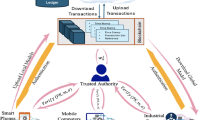Abstract
Federated learning is a novel machine learning framework that effectively satisfies the requirements of multiple organizations for data usage and model training while meeting privacy protection, data security, and government regulations. However, recent research has shown that attackers can infer users’ private information from their shared model parameters. To address the issue, in this paper, we propose the smart contract assisted secure aggregation scheme (SCSA). Firstly, we present a triple layers architecture based on blockchain for secure aggregation, which can adapt to application scenarios where a large amount of devices are involved in model training. Then, with the help of smart contracts, our scheme can efficiently distribute security masks to users in a decentralized form to ensure the security of parameters, and combine with secret sharing to design a double fault tolerance mechanism to effectively improve the robustness of the system. Finally, the theoretical analysis and simulation experiments prove that our scheme has high security and robustness while maintaining efficiency.
Supported by the National Natural Science Foundation of China under grant 62072065.
Access this chapter
Tax calculation will be finalised at checkout
Purchases are for personal use only
Similar content being viewed by others
References
Mcmahan, H.B., Moore, E., Ramage, D., Arcas, B.A.Y.: Communication-efficient learning of deep networks from decentralized data. CoRR, vol. abs/1602.05629 (2016). [Online]. Available: http://arxiv.org/abs/1602.05629
Xiong, Z., Cai, Z., Takabi, D., Li, W.: Privacy threat and defense for federated learning with non-i.i.d. data in AIoT. IEEE Trans. Ind. Inform. 18(2), 1310–1321 (2022)
Qin, Y., Kondo, M.: Mlmg: multi-local and multi-global model aggregation for federated learning. In: 2021 IEEE International Conference on Pervasive Computing and Communications Workshops and other Affiliated Events (PerCom Workshops), pp. 565–571 (2021)
Peter Kairouz, H., McMahan, B., Avent, B., Bellet, A.: Advances and open problems in federated learning (2021)
Li, J., Cheng, S., Li, Y., Cai, Z.: Approximate holistic aggregation in wireless sensor networks. In: 2015 IEEE 35th International Conference on Distributed Computing Systems, pp. 740–741 (2015)
Nasr, M., Shokri, R., Houmansadr, A.: Comprehensive privacy analysis of deep learning: passive and active white-box inference attacks against centralized and federated learning. In: IEEE Symposium on Security and Privacy (SP) (2019)
Pang, J., Huang, Y., Xie, Z., Han, Q., Cai, Z.: Realizing the heterogeneity: a self-organized federated learning framework for IoT. IEEE Internet Things J. 8(5), 3088–3098 (2021)
Ganju, K., Wang, Q., Yang, w., Gunter, C.A., Borisov, N.: Property inference attacks on fully connected neural networks using permutation invariant representations. In: ACM SIGSAC Conference, pp. 619–633 (2018)
Cai, Z., Xiong, Z., Xu, H., Wang, P., Li, W., Pan, Y.: Generative adversarial networks: a survey toward private and secure applications. ACM Comput. Surv. 54(6), 1–38 (2021)
Short, A.R., Leligou, H.C., Papoutsidakis, M., Theocharis, E.: Using blockchain technologies to improve security in federated learning systems. In: 2020 IEEE 44th Annual Computers, Software, and Applications Conference (COMPSAC), pp. 1183–1188 (2020)
Deng, Y., Han, T., Zhang, N.: Flex: trading edge computing resources for federated learning via blockchain. In: IEEE INFOCOM 2021 - IEEE Conference on Computer Communications Workshops (INFOCOM WKSHPS), pp. 1–2 (2021)
Xu, Y., et al.: BESIFL: blockchain empowered secure and incentive federated learning paradigm in IoT. IEEE Internet Things J. (2021)
Feng, L., Yang, Z., Guo, S., Qiu, X., Li, W., Yu, P.: Two-layered blockchain architecture for federated learning over the mobile edge network. IEEE Network 36(1), 45–51 (2022)
Yuwen, P., Chunqiang, H., Deng, S., Alrawais, A.: R\({^2}\)peds: a recoverable and revocable privacy-preserving edge data sharing scheme. IEEE Internet Things J. 7(9), 8077–8089 (2020)
Bonawitz, K., Ivanov, V., Kreuter, B., Marcedone, A., Seth, K.: Practical secure aggregation for federated learning on user-held data (2016)
Beguier C., Tramel, E.W.: SAFER: sparse secure aggregation for federated learning. CoRR abs/2007.14861 (2020)
Dowlin, N., Gilad-bachrach, R., Laine, K., Lauter, K., Wernsing, J.: CryptoNets: applying neural networks to encrypted data with high throughput and accuracy. IEEE (2016)
Nath S., Rastogi, V.: Private aggregation of distributed time-series data. US (2012)
Meng, T., Zhao, Y., Wolter, K., Cheng-Zhong, X.: On consortium blockchain consistency: a queueing network model approach. IEEE Trans. Parallel Dis. Syst. 32(6), 1369–1382 (2021)
Shamir, A.: How to share a secret. Commun. ACM 22(11), 612–613 (1979)
Author information
Authors and Affiliations
Corresponding author
Editor information
Editors and Affiliations
Rights and permissions
Copyright information
© 2022 The Author(s), under exclusive license to Springer Nature Switzerland AG
About this paper
Cite this paper
Wang, B., Hu, C., Liu, Z. (2022). A Secure Aggregation Scheme for Model Update in Federated Learning. In: Wang, L., Segal, M., Chen, J., Qiu, T. (eds) Wireless Algorithms, Systems, and Applications. WASA 2022. Lecture Notes in Computer Science, vol 13471. Springer, Cham. https://doi.org/10.1007/978-3-031-19208-1_41
Download citation
DOI: https://doi.org/10.1007/978-3-031-19208-1_41
Published:
Publisher Name: Springer, Cham
Print ISBN: 978-3-031-19207-4
Online ISBN: 978-3-031-19208-1
eBook Packages: Computer ScienceComputer Science (R0)




